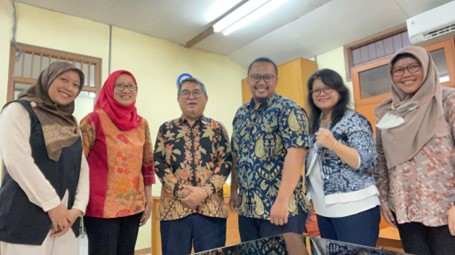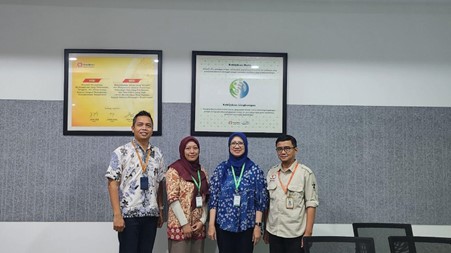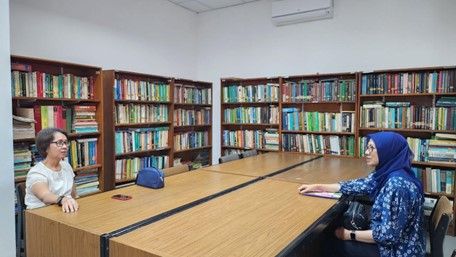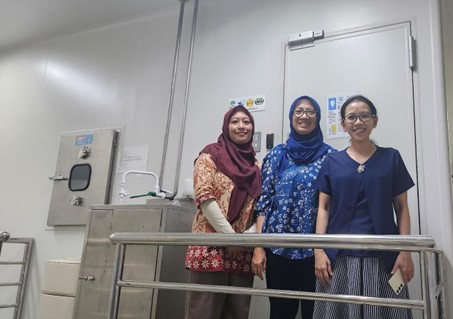This competitive grant is funded by the Biosecurity Engagement Program (BEP) of the US Department of State, through its working partner, Health Security Partner (HSP). Grant funding allocation is an important step in advancing transformative initiatives within the scientific community. Following the BSL-3/ABSL-3 workshop held on August 22-24, 2024, participants were given the opportunity to propose projects with transformative potential. This grant program offers funding of up to $30,000 USD. The aim of this competitive grant is to support the implementation of improvements in physical security, inventory management systems, waste management systems, procedure enhancements, training, and activities aimed at continuously enhancing biosecurity, biosafety, and biosafety management within facilities, based on identified gaps.
As the final activity in this grant funding program, INDOHUN conducted visits to grant recipient laboratories. The primary objectives of these visits include assessing the progress achieved as outlined in the grant proposals, ensuring compliance with grant guidelines and regulations, and identifying challenges or obstacles in project implementation. By facilitating direct interaction between grant recipients and evaluators, these visits encourage dialogue, collaboration, and optimization of grant outcomes, ultimately contributing to the advancement of scientific research and laboratory capacity building. These visits represent an important aspect of the grant allocation process, promoting transparency, accountability, and ultimately, the successful implementation of transformative projects aimed at advancing scientific research and biosafety and biosecurity standards.
Before the visit activities, grant recipient participants had already prepared reports on the usage and implementation of equipment purchased using grant funds. The series of visit activities includes visits to laboratories and laboratory facilities, ensuring that the proposed equipment is present in the laboratories, confirming that the equipment has been installed, ensuring that the equipment can enhance biosafety and biosecurity implementation, and discussing and evaluating aspects that can enhance laboratory capacity in biosafety and biosecurity.
Grant Recipient Participants:
After going through the grant recipient selection process, 7 institutions were selected as grant recipient participants, including:
- Faculty of Veterinary Medicine and Biomedical Sciences – IPB University, Bogor
- PT Genomic Solidarity Indonesia, Jakarta
- Padjadjaran University, Bandung
- PT Medion Farma Jaya, Bandung
- Bandung Institute of Technology
- Airlangga University (BSL-3), Surabaya
- Airlangga University (ABSL-3), Surabaya
Laboratory visits were conducted to 4 representative grant recipient laboratories with the following visit schedules:
- March 25, 2024:
- School of Veterinary Medicine and Biomedical Sciences, IPB University, Bogor

- March 28, 2024:
- PT. Medion Farma Jaya, Bandung
 Bandung Institute of Technology
Bandung Institute of Technology Padjadjaran University, Central Laboratory, Bandung
Padjadjaran University, Central Laboratory, Bandung

During the visits to the four representative institutions, we were warmly welcomed by teams from each institution. At SKHB IPB, we were received by Dr. Drh. Amrozi, Ph.D., Dean of the Faculty of Veterinary Medicine and Biomedical Sciences IPB, Dr. Andriyanto, MSc, Deputy Dean of the Faculty of Veterinary Medicine and Biomedical Sciences IPB, along with the laboratory team consisting of Hanan Mukriyadi, M.E, and Drh. Erlin Suzanna, and Drh Eka Krisna S.L. At Bandung Institute of Technology, we were received by Ir. V. Sri Harjati Suhardi, Ph.D., along with Fina Wulandari and the laboratory team. Meanwhile, at Medion, we were received by Mr. Fransiskus Wijakongko and his IT team. Lastly, at Padjadjaran University, we were welcomed by Mrs. Lidya Chaidir, M.Sc, Ph.D., and Mrs. Ilma along with their laboratory team.
During these visits, the visitation team focused on ensuring that the equipment/materials obtained from the grant were received and available in their respective laboratories. Additionally, direct visits to the laboratories were made to observe the implementation of safety enhancements and the application of Bio Risk Management (BRM), with Dr. Diah Iskandriati providing valuable input regarding BRM implementation in the laboratories.
The procurement of laboratory equipment from this grant funding is expected to have many positive impacts on research quality, project outcomes, and grant management overall. By providing opportunities for direct observation and assessment, grant evaluators can offer valuable feedback and guidance to recipients, thus enhancing the quality and efficiency of research efforts. Successful grant visits often result in tangible improvements in project performance and grant utilization. These visits allow grant recipients to showcase their achievements and successes, fostering trust among donors and stakeholders towards effective grant resource management. Ultimately, grant visits to laboratories play a crucial role in maximizing the impact and value of grant investments, driving innovation, and advancing scientific knowledge.

Leave a Reply